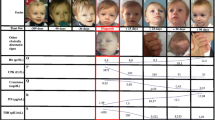Abstract
Background
Hypothyroidism with impairment of renal function and raised creatinine phosphokinase (CPK) is described in adults and children with acquired hypothyroidism, but not in congenital hypothyroidism.
Case presentation
A male infant born at term weighing 3390 g was seen aged 2 months with prolonged jaundice. Examination showed somnolence, umbilical hernia, enlarged fontanelles and lower limb edema; length 55 cm (−1.5 SD), weight 5.4 kg (−0.13 SD). Biochemistry showed fT4 < 1 pmol/L, TSH = 1044.36 μUI/mL, creatinine 77 μmol/L(normal <35 μmol/L), estimated glomerular filtration rate (GFR) 26 ml/min/1.73 m2, CPK 3952.5 IU/L (normal<400 IU/L). Ultrasound showed no thyroid tissue in the neck. In view of the renal impairment, peritoneal dialysis was initially contemplated but postponed and the child received levothyroxine 10 μg/kg/day. Two months later thyroid function tests, CPK and renal function had all normalized with creatinine 19 μmol/L and GFR 116 ml/min/1.73m2.
Discussion
Reversible renal impairment is attributable to severe congenital hypothyroidism causing decreased myocardial contractility and cardiac output and to a direct effect on the kidneys. Thyroid function should be checked in infants with renal impairment of unknown cause. Cautious fluid management is indicated in hypothyroid infants. Hypothyroidism may also be associated with elevated serum CPK levels but resolves with thyroxin therapy.

Similar content being viewed by others
References
Gheissari A, Hashemipour M, Khosravi P, Adibi A. Different aspects of kidney function in well-controlled congenital hypothyroidism. J Clin Res Pediatr Endocrinol. 2012;4(4):193–8.
Iglesias P, Diez JJ. Thyroid dysfunction and kidney disease. Eur J Endocrinol. 2009;160(4):503–15.
Napoli R, Guardasole V, Zarra E, D'Anna C, De Sena A, Lupoli GA, et al. Impaired endothelial- and nonendothelial-mediated vasodilation in patients with acute or chronic hypothyroidism. Clin Endocrinol (Oxf). 2010;72(1):107–11.
Dragović T. Reversal deterioration of renal function accompanied with primary hypothyroidism. Vojnosanit Pregl. 2012;69(2):205–8.
Elgadi A, Verbovski P, Marcus C, Berg UB. Long-term effects of primary hypothyroidism on renal function in children. J Pediatr. 2008;152:860–4.
Marzuillo P, Grandone A, Perrotta S, Ruggiero L, Capristo C, Luongo C, et al. Very early onset of autoimmune thyroiditis in a toddler with severe hypothyroidism presentation: a case report. Ital J Pediatr. 2016;42:61.
Montenegro J, Gonzalez O, Saracho R, Aguirre R, Martinez I. Changes in renal function in primary hypothyroidism. Am J Kidney Dis. 1996;27:195–8.
Vikrant S, Chander S, Kumar S, Gupta D. Hypothyroidism presenting as reversible renal impairment: an interesting case report. Ren Fail. 2013;35(9):1292–4.
Verhelst J, Berwaerts J, Marescau B, Abs R, Neels H, Mahler C, et al. Serum creatine, creatinine, and other guanidino compounds in patients with thyroid dysfunction. Metabolism. 1997;46(9):1063–7.
El Ters M, Patel SM, Norby SM. Hypothyroidism and reversible kidney dysfunction: an essential relationship to recognize. Endocr Pract. 2014;20(5):490–9.
Al-Fifi S, Girardin C, Sharma A, Rodd C. Moderate renal failure in association with prolonged acquired hypothyroidism in children. Acta Pediatr. 1999;88:715–7.
Schwartz GJ, Haycock GB, Edelman CM, Spitze A. A simple estimate of glomerular filtration rate in children derived from body length and plasma creatinine. Pediatrics. 1976;58:259–63.
Guler HP, Eckardt KU, Zapf J, Bauer C, Froesch ER. Insuline-like growth factor I increase glomerular filtration rate and renal plasma flow in man. Acta Endocrinol (Copenh). 1989;121:101–6.
Klanke B, Simon M, Rockl W, Weich HA, Stolte H, Grone HJ. Effects of vascular endothelial growth factor/vascular permeability factor on haemodynamics and permselectivity of the isolated perfused rat kidney. Nephrol Dial Transplant. 1998;13:875–85.
Schmid C, Brändle M, Zwimpfer C, Zapf J, Wiesli P. Effect of thyroxine replacement on creatinine, insulin-like growth factor 1, acid-labile subunit, and vascular endothelial growth factor. Clin Chem. 2004;50(1):228–31.
Asami T, Uchiyama M. Elevated serum creatinine levels in infants with congenital hypothyroidism: reflection of decreased renal function. Acta Paediatr. 2000;89:1431–4.
Ahmed GS, Zaid HM, Moloney M. Hashimoto’s thyroiditis presenting as Hoffman’s syndrome, rhabdomyolysis and acute kidney injury. BMJ Case Rep. 2014;2014:bcr2013203269.
Gunther DF, Chiu HK, Numrych TE, Kletter GB. Onset of acquired autoimmune hypothyroidism in infancy: a presentation of delayed gross-motor development and rhabdomyolysis. Eur J Pediatr. 2006;165:320–2. https://doi.org/10.1007/s00431-005-0051-6.
Acknowledgements
This study couldn’t have been carried out without the parents being as interested as we were in understanding their child’s evolving situation. We thank them for their permission and willingness to report this case so as to be useful to other children.
The authors would also like to thank Dr. Malcolm Donaldson for his careful review, valuable assistance, helpful suggestions and enthusiastic support.
Author information
Authors and Affiliations
Corresponding author
Ethics declarations
Conflict of interest
All the authors declare that they have no conflict of interest.
Ethical approval
All procedures performed in this study were in accordance with the ethical standards of the institutional research committee and with the 1964 Helsinki declaration and its later amendments.
Informed consent
Informed consent was obtained from the child’s parents.
Additional information
Publisher’s note
Springer Nature remains neutral with regard to jurisdictional claims in published maps and institutional affiliations.
Established facts
• Hypothyroidism can impact renal function in adults and children
• There are few data about renal function in infants with congenital hypothyroidism
• There are no data concerning renal failure in infants with CH
Novel insights
• Renal failure can occur in infant with severe congenital hypothyroidism
• Thyroid hormone replacement restores renal function
Rights and permissions
About this article
Cite this article
Essaddam, L., Ben Mansour, A., Missaoui, N. et al. Congenital hypothyroidism presenting with reversible renal impairment: an under-recognised problem?. J Diabetes Metab Disord 18, 733–738 (2019). https://doi.org/10.1007/s40200-019-00430-1
Received:
Accepted:
Published:
Issue Date:
DOI: https://doi.org/10.1007/s40200-019-00430-1




